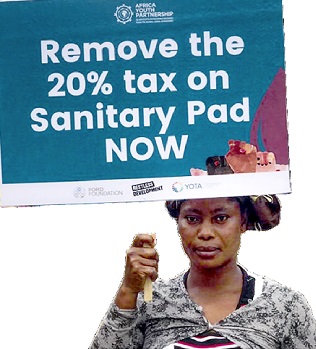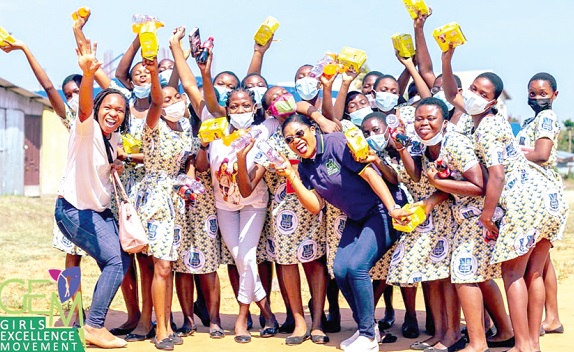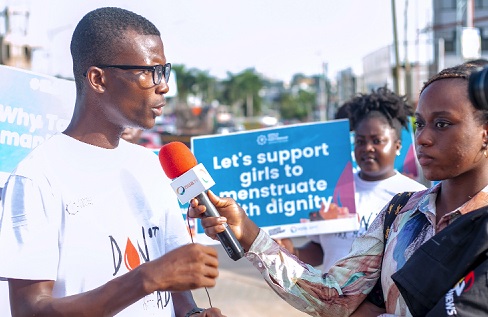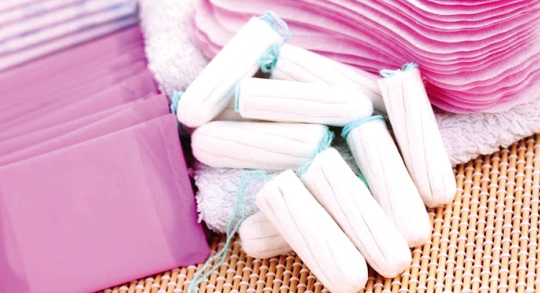
Period poverty: Menstruation should not be financial burden
On Saturday, August 22, 2020, the Vice President, Dr Mahamudu Bawumia, gave an assurance that the New Patriotic Party (NPP) government would remove import duties on sanitary pads if its mandate was renewed for the next four years.
Similarly in 2014, the then John Dramani Mahama-led government joined a World Bank pilot programme to distribute sanitary pads to school girls. That project was aimed at keeping girls in school during their menstrual period. However, the programme was not sustained due to misconception and perceived political opposition to the programme.
Advertisement
Menstrual hygiene products are classified as luxury products and heavily taxed making it unaffordable for women and girls in low-income homes and deprived communities in the country. Ultimately, the most important thing is for government to remove the taxes to make the products more accessible for low-income consumers and then follow that with steps to supply girls in very deprived areas with sanitary pads.

Despite the many calls and advocacy to have these taxes removed, nothing has been done. There was no mention of this waiver in the 2023 budget presented to parliament last month. Rather, an increase in VAT from 12.5 to 15 per cent which will further increase the prices of menstrual hygiene products and make them unaffordable was what featured.
“For years, advocates on menstrual hygiene have been on the necks of governments to provide tax waivers on menstrual products. Government after government have come and gone. Yet the status quo has remained. Women and their reproductive health have been relegated to the list of unimportant issues to be handled,” said the Founder of Period Matters, Able Delalie.
She noted that with the no mention of tax waivers on menstrual products in the 2023 budget, 2023 will most likely be as financially and psychologically draining as the years before.
The Founder and Executive Director of Girls Excellence Movement (GEM), Juliana Ama Kplorfia, for her part said menstrual products were a necessity but because it was treated as luxury in the taxing system, it made it unaffordable for girls, especially in this economic crisis.
“The current economic crisis has made the commodity more unaffordable because families now have to think about other more ‘important’ things and prioritise those basic needs above sanitary pads,” she said.
Prices of sanitary pads
As of June 2022, the prices of sanitary pads were as follows: A pack of Yazz - GH¢11; Propa GH¢11; Softcare GH¢8; Always GH¢ 12; Cute woman GH¢4.50.
With the current economic crisis, the prices have shot up again and will see further increment next year when the new VAT comes into force. A pack of Yazz is between GH¢17 and GH¢22; Propa GH¢ 17; Softcare GH¢14; Always GH¢18 while the double pack sells at GH¢24; Cute Woman GH¢12 as of the time of filing this article.
Period poverty
Period poverty is not just for the poor and middle class. The increase in the price of sanitary pads has got everyone complaining.

Menstrual hygiene products are expensive and this is a shared sentiment from high, middle to low income earners. So you can imagine the plight of young girls and women in deprived communities. How are they managing their monthly flow? Even for women who do not experience period poverty, high-quality feminine hygiene products often also come with a high sticker price.
“With all the issues these price hikes are causing, the biggest one to me is the price of menstrual pads! Period poverty is increasing right before our eyes and there isn’t enough being done! Can’t we start with the removal of the 20 per cent tax on pads? We need to reduce the cost!” popular Citi FM presenter, AJ Akuoku-Sarpong tweeted.
For 16-year-old Odeibea, who lives at Suhum, buying sanitary pads has become “a problem and I sometimes use toilet roll during that time of the month”.
Scrap 20 per cent campaign
The World Bank estimates that 500 million women and girls globally lack access to adequate facilities for menstrual hygiene management. Research from Plan International UK, revealed that three in 10 girls and women aged 14-21 had issues either affording or accessing feminine hygiene products during the COVID-19 lockdown, and that more than 54 per cent of them had resorted to toilet paper as an alternative.
There have been many advocacy, campaigns and petitions calling on government to remove the taxes on menstrual hygiene products to make them affordable.
Recently, the Africa Youth Partnership – Ghana Youth Task Team, launched the ‘Scrap the 20 per cent Luxury Tax Off Menstrual Products in Ghana” campaign.
The campaign appealed to government to remove taxes on menstrual products and also establish firms to produce menstrual products locally.
According to the Co-Lead of the Ghana Youth Task Force, Francis Ametepey, the current economic state and the post COVID-19 era made menstrual products less affordable for the vast majority of consumers.
“The menstrual product tax exacerbates period poverty and negatively impacts the quality of life of women by decreasing the accessibility of menstrual products,” he said.
Mr Ametepey noted that sanitary pads and tampons were designed in commensuration with health and sanitary considerations making them safer to use than older methods and must, therefore, be safeguarded to reduce poor menstrual hygiene and menstrual-related infections.
So far, the petition has garnered 11,948 signatures. The team has started stakeholder engagement by meeting policy makers to strategise on presenting the petition to the Speaker of Parliament and the Ministry of Finance.

Downsides
Apart from the myths and misconceptions about menstruation, when women and girls do not have access to menstrual hygiene products which negatively impacts on them. Some may resort to using unhygienic materials to collect blood which may lead to infections and other medical problems. Others may skip school which will negatively impact on their education. According to Action Aid, one in 10 girls in Africa missed school because they did not have access to menstrual products, or because there weren’t safe, private toilets to use at school.
Teenage girls are most vulnerable during their menstrual cycle and it is important to help these girls not to be part of the statistics. Lack of access to menstrual products have led some teenage girls to do the unthinkable. Some engage in transactional sex for sanitary pads.
Ms Kplorfia said in a situation where a girl could not totally afford the sanitary pad and there was no family member to help, she would look for benefactor(s) who sometimes took advantage of them because the constant demand for pads made them vulnerable. Some girls, she said, willingly offered sex in exchange for pads.
The distress associated with period poverty is linked to the Sustainable Development Goals - 1 (No poverty); 3 (Good Health and Wellbeing); 4 (Quality Education), 5 (Gender Equality) and 6 (Clean water and sanitation)
In order to achieve the SDGs, there is still more that can be done. First and foremost is for society to normalise menstruation.
There is a need to remove the myths, misconceptions and taboos about menstruation. It is a natural phenomenon.
Education is important and every child – male and female should be educated about periods, and given the right information in order to remove the stigma around it. Also, better toilet and sanitation facilities in schools and communities are essential to reduce the problem of girls missing school days.

Take action
Ultimately, the most important thing is for government to remove menstrual hygiene to make the products more accessible for low-income consumers and then follow that with steps to supply girls in very deprived areas with sanitary pads.
“Please take off the tax. It is unheard of, especially in this 21st century. In this economic crisis that families are struggling to provide three square meals, the tax makes sanitary pads, which is a basic necessity, a luxury that many cannot afford and it is affecting girls’ education. It is exposing girls to sexual abuse” Ms Kplorfia appealed.
She said a girl not having access to menstrual hygiene products did not end with the girl soiling herself, but rather created more social crisis that government would then have to create interventions for later.
There are countries that have taken the lead and shown that it is possible to remove tax on menstrual products. In 2020, Scotland became the first country in the world to offer free sanitary products to all women.
Kenya became the first country in the world to remove taxes on imports of sanitary products in 2004. Canada, Australia, Kenya, India, Jamaica, Nicaragua, Nigeria, Lebanon, Malaysia, Colombia, South Africa, Namibia, and Rwanda have all put in measures to remove tax on period products.
Period poverty is everyone’s business and it is important to reiterate the call on government to remove this unequal tax burden on women and girls. Menstruation is a natural phenomenon, a basic human right and women and girls should not be taxed for this.
Writer’s email: [email protected]



